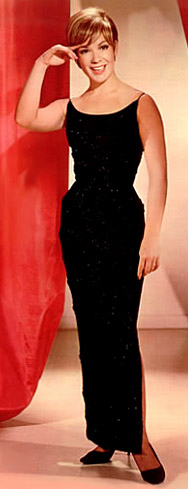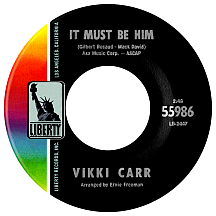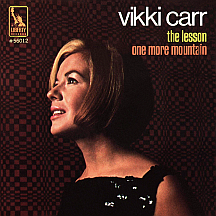VIKKI CARR
It Must Be Him
Florencia Bisenta de Casillas Martinez Cardona had a simple game plan: sing and keep on singing, combine Spanish songs with English, and vice versa, and connect with as many people as possible through her passion for music. One other thing: she had to come up with a shorter name that would be easier to pronounce. Florence Cardona made sense. Someone suggested Carlita, a variation on her father's name, Carlos...and that worked for awhile! She was born on the border, El Paso, Texas, first child of seven, and the family moved to Los Angeles during her infancy. Mariachi, bolero and big band music was about all she heard growing up and when she turned 18, in 1959, the soon-to-be lounge singer began the long process of breaking into the music business.
She joined a Mexican-Irish band headed by Pepe Callahan, getting the gig because of her ability to sing in both languages. The band regularly appeared at Irwin Schuman's Chi Chi Club in Palm Springs during its last days as a trendy night spot (Schuman sold the club in '61 and the buzz died down). She performed in California and at Reno and Las Vegas casinos with lounge acts like The Fabulous Woodsons, The Chuck Leonard Quartet and The Andrini Brothers. A stage name progression had taken place, from Cardona to Carlita to the anglicized Vikki Carr. Not content simply being stuck in a small club somewhere, a solo audition tape was made and submitted to a great many record companies and her perseverance found a taker: Sy Waronker of L.A.'s Liberty Records. In the spring of 1962, producer Snuff Garrett placed her in a sort of no-woman's-land between pop and country with a touch of the Latin sound on her first single, "I'll Walk the Rest of the Way."
Shortly afterwards a demo of a Gene Pitney song, "He's a Rebel," landed on Waronker's desk. Dialing back her mature vocal sound (she was all of 21) to something more teenaged in approach, the track was recorded, it was quite good, and the obvious decision was made: get that record to radio...quick! Phil Spector stopped by the studio (previously a producer for Liberty, by summer '62 he'd been cranking out hits for his own Philles Records and was granted perhaps too much free rein to wander the hallways of his former employer); getting wind of what was going on, he wasted no time in recording a version with The Crystals...only they weren't available on short notice, so he used The Blossoms (Darlene Love handling the lead vocal) but issued it as the Crystals anyway. With due respect to Miss Carr, Spector's underhanded move resulted in a classic; the Crystals track blasted to number one because it smoked! Vikki shrugged her shoulders and moved on to the next assignment, a Garrett-helmed novelty one-off with Jerry Naylor (lead singer of The Crickets, signed to Liberty at the time). "Submarine Race" was credited to Danny and Gwen, a novelty song (Vikki's part as "Gwen" was spoken) that went nowhere. Meanwhile, her "Rebel" rouser broke big in Australia, so she headed there to tour. The single went top ten somewhere, at least!
She landed a regular spot on The Ray Anthony Show, a syndicated series that aired from January through July 1963; Vikki and Lisa Marné were Ray's "Bookends" and had plenty of opportunities to show off their vocal chops over the course of 27 episodes. Despite her success down under, a girl-pop career didn't appear to be in the cards. A decision was made to position her as an album artist (a newcomer named Barbra Streisand had so far been knocking 'em dead without the apparent need for a hit single). A Grammy nomination in early '64 for Best New Artist convinced the bosses at Liberty they'd made the right decision. Vikki's audience between '63 and '66 skewed much older than the typical top 40 fan; Spanish songs became a part of her regular repertoire, though pop standards filled most of the slots on her albums. She supplied the singing voice for Cyd Charisse in the 1966 Dean Martin/Matt Helm detective/spy flick The Silencers, then appeared on the Easy Listening charts with a remake of "My Heart Reminds Me" (Della Reese and Kay Starr had separately established the song nine years earlier), followed by "So Nice," a vocal version of Walter Wanderley's instrumental hit "Summer Samba." Her ticket to major stardom unceremoniously appeared on the flip side of the latter 45.

French singer Gilbert Becaud had written and recorded "Seul Sur Son Etoile" (the title translates as "alone on his star"); lyrics by American composer Mack David gave it a desperate, yearning quality: '...as I grab the phone I pray...let it please be him, oh dear God, it must be him...or I shall die...' Liberty executives had little faith in the potential of "It Must Be Him." Promoters and label reps in England (she included it in her set during a European tour the following year) were similarly negative, yet based on audience reaction, it was released and hit number two on the U.K. chart in July 1967. Back at home, Liberty took note, jumped on the bandwagon, made it a priority...and the rerelease topped out at number three in November. Three Grammy noms came a few months later (her main competition being Bobbie Gentry, whose notorious "Ode to Billie Joe" won in two of the three categories). Vikki found herself on the fast track, which kept her busy for the rest of the decade, performing in high-end venues and making numerous appearances on network TV variety shows.
David came up with more contributions to Carr's repertoire; "The Lesson" hit the top 40 in January '68 (like its predecessor, it reached number one on the Easy Listening charts) and "She'll Be There" had a less spectacular run a few months later, its flip, "Your Heart is Free Just Like the Wind" (composed by three Frenchmen with a lyrical translation by Brit John Shakespeare), the preferred side on many stations. "Don't Break My Pretty Balloon," penned by Van McCoy, came along in the spring. These hits all had one thing in common: they dealt with heartbreaking romantic themes, a "don't mess with success" reaction to the song that had made Carr a household name in the U.S. A Bobby Goldsboro song, "With Pen in Hand" (which had been a minor hit for Billy Vera a year before), reveals a breakup story that pulls no punches; Vikki's version returned her to the top 40 in June 1969.
In late '68 she hosted her own U.K.-based variety show, It's Vikki Carr, though it didn't last long. On her home turf, she took advantage of the proliferation of network and syndicated variety series, appearing on the top shows (The Smothers Brothers Comedy Hour, Ed Sullivan Show, Jackie Gleason, Glen Campbell, Joey Bishop, Carol Burnette, Johnny Cash, Dean Martin, This is Tom Jones and so on), hosting a few along the way (The Hollywood Palace and, in 1970, her first of several fill-ins for Johnny Carson on The Tonight Show) while doing some acting on the side (a 1972 episode of The Mod Squad!). In later years she tackled challenging, high-profile projects on the musical stage (South Pacific, The Unsinkable Molly Brown).
After moving to Columbia Records in 1971, her Spanish output increased considerably, beginning with the 1972 album En Español. The first of three Grammy wins came for 1985's Simplemente Mujer in the category Best Mexican-American Performance and she scored a number one Latin hit in '91 with "Cosas del Amor," a duet with Sinaloan singing sensation Ana Gabriel. That busy late-'60s period I mentioned? To this day, it really hasn't slowed down much. Vikki Carr is a worldwide star...and she still brings down the house when she sings "It Must Be Him"!



